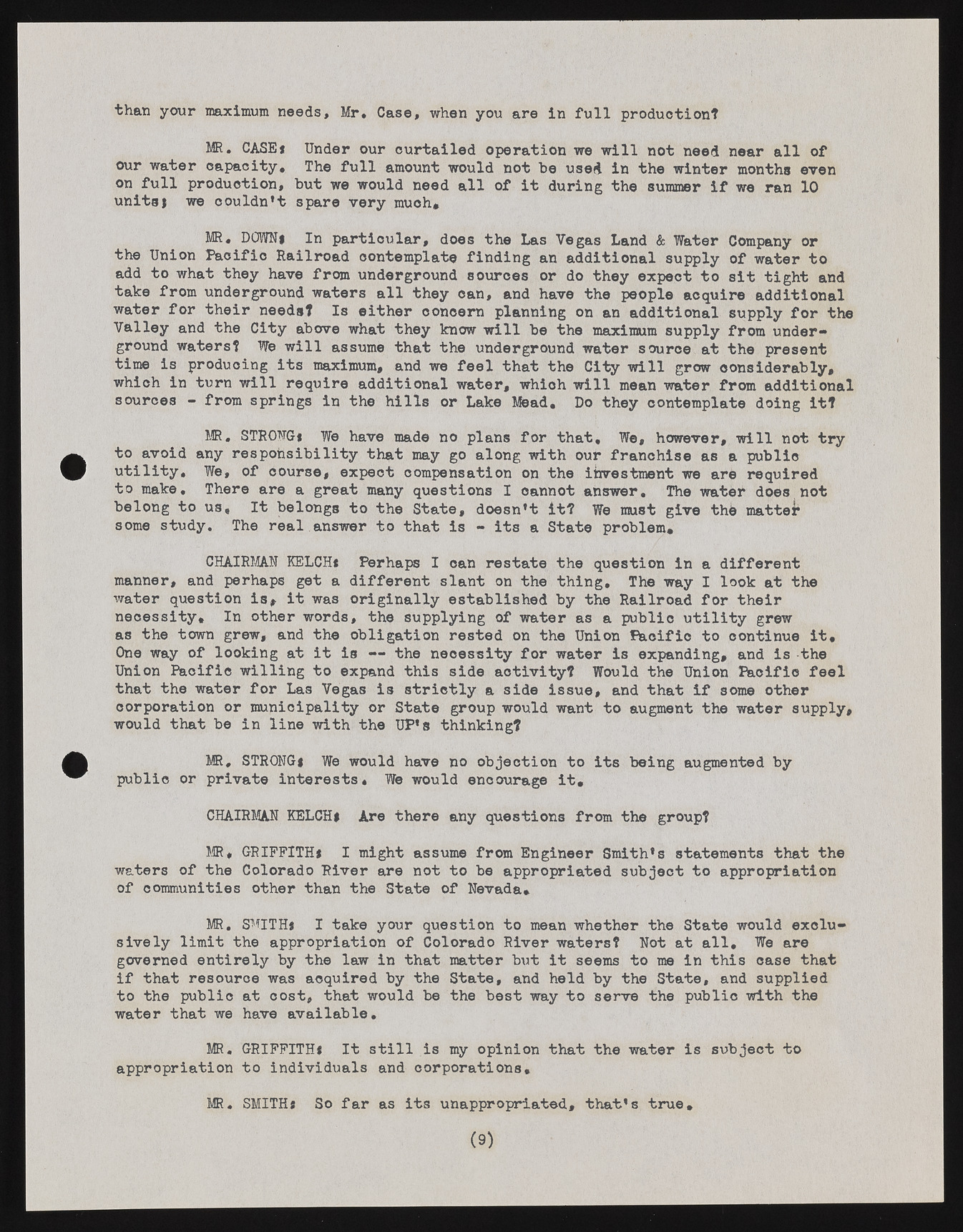Copyright & Fair-use Agreement
UNLV Special Collections provides copies of materials to facilitate private study, scholarship, or research. Material not in the public domain may be used according to fair use of copyrighted materials as defined by copyright law. Please cite us.
Please note that UNLV may not own the copyright to these materials and cannot provide permission to publish or distribute materials when UNLV is not the copyright holder. The user is solely responsible for determining the copyright status of materials and obtaining permission to use material from the copyright holder and for determining whether any permissions relating to any other rights are necessary for the intended use, and for obtaining all required permissions beyond that allowed by fair use.
Read more about our reproduction and use policy.
I agree.Information
Digital ID
Permalink
Details
Member of
More Info
Rights
Digital Provenance
Publisher
Transcription
than your maximum needs, Mr. Case, when you are in fu ll production? MR. CASE* Under our curtailed operation we w ill not need near a ll of our water capacity. The fu ll amount would not be used in the winter months even on f u ll production, but we would need a ll of i t during the summer i f we ran 10 units* we couldn’ t spare very much# MR, DOWN* In particular, does the Las Vegas Land & Water Company or the Union P acific Railroad contemplate finding an additional supply of water to add to what they have from underground sources or do they expect to s it tight and take from underground waters a ll they can, and have the people acquire additional water fo r th eir needs? Is either concern planning on an additional supply fo r the Valley and the City above what they know w ill be the maximum supply from underground waters? We w ill assume that the underground water source at the present time is producing its maximum, and we fe e l that the City w ill grow considerably, which in turn w ill require additional water, whioh w ill mean water from additional sources - from springs in the h ills or Lake Mead. Do they contemplate doing it ? MR, STRONG* We have made no plans fo r that. We, however, w ill not try to avoid any resp oh sib ility that may go along with our franchise as a public u t ilit y . We, of course, expect compensation on the investment we are required to make. There are a great many questions I oannot answer. The water does not belong to us, I t belongs to the State, doesn’ t it ? We must give th£ matted some study. The real answer to that is - its a State problem* CHAIRMAN KELCH* Perhaps I can restate the question in a d ifferent manner, and perhaps get a differen t slant on the thing. The way I look at the water question i s , i t was origin a lly established by the Railroad fo r their necessity* In other words, the supplying of water as a public u t ilit y grew as the town grew, and the obligation rested on the Union P a cific to continue i t . One way o f looking at i t is — the necessity fo r water is expanding, and is the Union P acific w illin g to expand this side a ctiv ity ? Would the Union P acific fe e l that the water fo r Las Vegas is s tr ic t ly a side issue, and that i f some other corporation or municipality or State group would want to augment the water supply, would that be in line with the UF’ s thinking? MR, STRONG* We would have no objection to it s being augmented by public or private in terests. We would encourage i t , CHAIRMAN KELCH* Are there any questions from the group? I©# GRIFFITH* I might assume from Engineer Smith’ s statements that the waters o f the Colorado Fiver are not to be appropriated subject to appropriation of communities other than the State of Nevada* MR. S^ITH* I take your question to mean whether the State would exclusively lim it the appropriation o f Colorado River waters? Not at a l l . We are governed en tirely by the law in that matter but i t seems to me in this case that i f that resource was acquired by the State, and held by the State, and supplied to the public at cost, that would be the best way to serve the public with the water that we have available. MR. GRIFFITH* I t s t i l l is my opinion that the water is subject to appropriation to individuals and corporations, MR. SMITH* So fa r as its unappropriated, that’ s tru e. 0 )

